

Neuroscientists say multitasking literally drains the energy reserves of your brain — Quartz. Does your morning routine consist of checking emails, browsing Facebook, downing coffee, heading to the train while Googling one last idea, checking notifications, more coffee, and going through your work email?
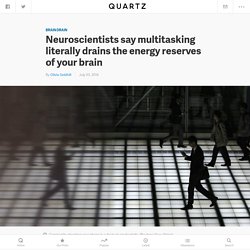
The very myriad of activities crammed into your morning, and the constant switching between them, is likely making you very tired. When we attempt to multitask, we don’t actually do more than one activity at once, but quickly switch between them. And this switching is exhausting. It uses up oxygenated glucose in the brain, running down the same fuel that’s needed to focus on a task. A civil servant missing most of his brain challenges our most basic theories of consciousness — Quartz. Not much is definitively proven about consciousness, the awareness of one’s existence and surroundings, other than that its somehow linked to the brain.
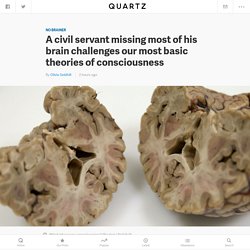
But theories as to how, exactly, grey matter generates consciousness are challenged when a fully-conscious man is found to be missing most of his brain. And yet the man was a married father of two and a civil servant with an IQ of 75, below-average in his intelligence but not mentally disabled. Doctors believe the man’s brain slowly eroded over 30 years due to a build up of fluid in the brain’s ventricles, a condition known as “hydrocephalus.” His hydrocephalus was treated with a shunt, which drains the fluid into the bloodstream, when he was an infant. But it was removed when he was 14 years old. How Did Consciousness Evolve? Ever since Charles Darwin published On the Origin of Species in 1859, evolution has been the grand unifying theory of biology.

Yet one of our most important biological traits, consciousness, is rarely studied in the context of evolution. Theories of consciousness come from religion, from philosophy, from cognitive science, but not so much from evolutionary biology. Maybe that’s why so few theories have been able to tackle basic questions such as: What is the adaptive value of consciousness? When did it evolve and what animals have it? The Attention Schema Theory (AST), developed over the past five years, may be able to answer those questions. Future - The enormous power of the unconscious brain. If you don’t think the act of stacking and shuffling a set of cups could boggle your mind, watch the video below. In it, neuroscientist David Eagleman introduces 10-year-old Austin Naber – a world record-holding, champion cup stacker.
Naber moves the cups around at a blistering pace and when Eagleman has a go at keeping up with him, the difference in skill and speed becomes immediately apparent. “He smoked me,” Eagleman admits. “But the bigger point is that when I’m doing it, it’s my first time cup stacking. It’s all conscious for me, I’m burning a lot of energy trying to figure out the rules; how the cups balance.” Both Eagleman and Naber had their brain activity monitored via an electroencephalogram (EEG). “His brain was much more serene than mine because he had automised his behaviour,” explains Eagleman. Psychology Journals. All In The Mind. Archive. PSYCLINE: Your Guide to Psychology and Social Science Journals on the Web. Monitor on Psychology. All issues / School Research / School of Education / Faculty of Education and Arts / Faculties and schools / Governance and leadership / About UoN. Scientificamericanmind1204 62.
Scientificamericanmind0312 22. Altered state of consciousness. An altered state of consciousness (ASC),[1] also called altered state of mind, is any condition which is significantly different from a normal waking beta wave state.
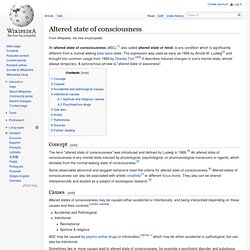
The expression was used as early as 1966 by Arnold M. Ludwig[2] and brought into common usage from 1969 by Charles Tart.[3][4] It describes induced changes in one's mental state, almost always temporary. American Psychological Association (APA) Oxford Psychology 3 and 4 2e Ch2 Normal waking consciousness. The Cognitive Costs of Multitasking. By Kendra Cherry Updated May 22, 2015.

Quick Overview: Multitasking can reduce productivity by approximately 40-percent according to some researchers.Switching from one task to another makes it difficult to tune out distractions and can cause mental blocks that can slow you down. Is All That Multitasking Really Making You More Productive? Take a moment and think about all of the things you are doing right now. Perhaps you're also listening to music, texting a friend, checking your email in another browser tab, or playing a computer game. If you are doing several different things at once, then you may be what researchers refer to as a "heavy multitasker. " In the past, many people believed that multitasking was a good way to increase productivity. About.com Search - Find it now! Freud's Conscious and Unconscious Mind. By Kendra Cherry Updated December 17, 2015.
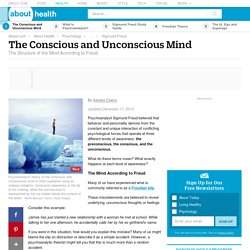
Psychoanalyst Sigmund Freud believed that behavior and personality derives from the constant and unique interaction of conflicting psychological forces that operate at three different levels of awareness: the preconscious, the conscious, and the unconscious. Consciousness. 1.
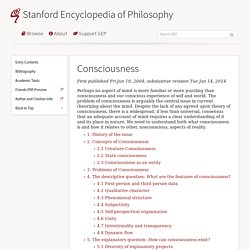
History of the issue Questions about the nature of conscious awareness have likely been asked for as long as there have been humans. Neolithic burial practices appear to express spiritual beliefs and provide early evidence for at least minimally reflective thought about the nature of human consciousness (Pearson 1999, Clark and Riel-Salvatore 2001). Preliterate cultures have similarly been found invariably to embrace some form of spiritual or at least animist view that indicates a degree of reflection about the nature of conscious awareness. Nonetheless, some have argued that consciousness as we know it today is a relatively recent historical development that arose sometime after the Homeric era (Jaynes 1974). Although the words “conscious” and “conscience” are used quite differently today, it is likely that the Reformation emphasis on the latter as an inner source of truth played some role in the inward turn so characteristic of the modern reflective view of self. 2. Sentience. 3.
Consciousness. Representation of consciousness from the seventeenth century by Robert Fludd, an English Paracelsian physician Inter-disciplinary perspectives[edit] Recently, consciousness has also become a significant topic of interdisciplinary research in cognitive science, involving fields such as psychology, linguistics, anthropology,[11] neuropsychology and neuroscience.
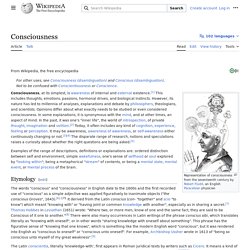
In Chapter 06: Memory. Psychology: An Introduction Table of Contents Next page Copyright© 2007-2011Russ Dewey.
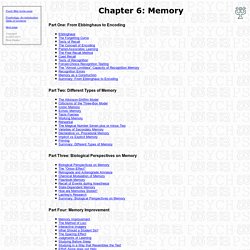
In Chapter 03: States of Consciousness.